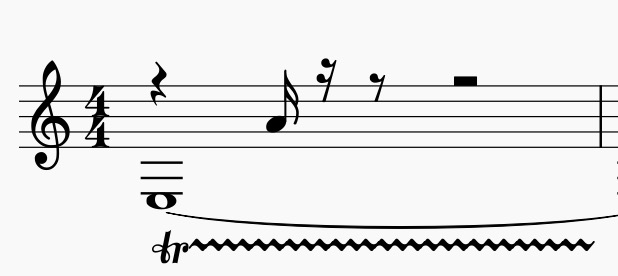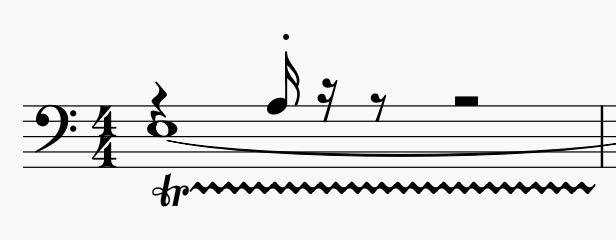Page 1 of 1
Vocal score yet again.
Posted: 09 Dec 2019, 16:45
by David Ward
Here are two screenshots of a bit of spoken dialogue with partial instrumental accompaniment from a chamber opera, one of the full score, the other of the vocal score.
Question: despite the simple texture, it's obviously impossible for the vocal score pianist to play each of the three elements at their full score pitch; so do members of this forum think I have chosen the most effective (and playable) solution? Or…?
Re: Vocal score yet again.
Posted: 09 Dec 2019, 19:27
by Callasmaniac
Liszt would have used his nose for bassoon notes.
Re: Vocal score yet again.
Posted: 10 Dec 2019, 06:40
by OCTO
I think I would notate your LH this way:

- scrsht 2019-12-10 at 07.35.19.jpg (29.47 KiB) Viewed 7123 times
Yet, as with piano REDUCTION, you need to simulate the orchestra even by octaving. Perhaps this solution would work in LH:

- scrsht 2019-12-10 at 07.36.55.jpg (27.18 KiB) Viewed 7123 times
Re: Vocal score yet again.
Posted: 15 Dec 2019, 11:55
by HaraldS
In writing out a piano accompainment part you take over the work which is otherwise required from pianists themselves. That perfectly allright, but there are quite some piano reductions which aren't very much reductions, but instead give the original pitches even if it's unplayable on a piano. Then it's up to the pianist to decide what he wants to play. Possibly, the pianist can better adapt to the rehearsal's necessities if he can decide himself what to incorporate in his playing.
Side note:
Mother: [...] We need to have people who understand Europe, who know what's happening. You are the future...
This is so true.
Re: Vocal score yet again.
Posted: 15 Dec 2019, 15:52
by John Ruggero
David, your solution (which seems to be the same as OCTO who may not have seen all of your example) is fine. You even give the information about the real position of the bassoon notes, which is helpful.
HaraldS, I have a completely different point of view. I don't think that pianists should be asked to do the work of the composer or arranger. Piano reductions take considerable thought and skill and in my experience are rarely carried out perfectly because it is such a test of the arranger's ear and hand. But that doesn't mean that the composer shouldn't try to do his or her best. I think that a reduction should be as well cast for the piano as any original solo.
Brahms enjoyed making his own reductions for both solo piano, duet and duo and did it superbly. His advice: leave out as many notes as possible while still giving the same effect. Liszt was probably the greatest arranger for piano of all time. His arrangements of Beethoven's symphonies for solo piano should be studied by all composers who do piano reductions. He carries out Brahms' approach in a masterful way.